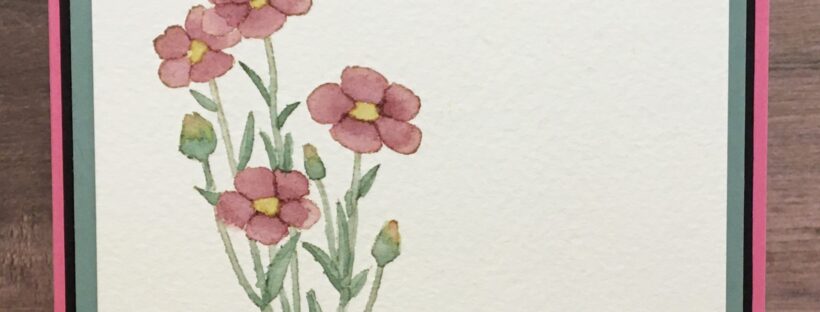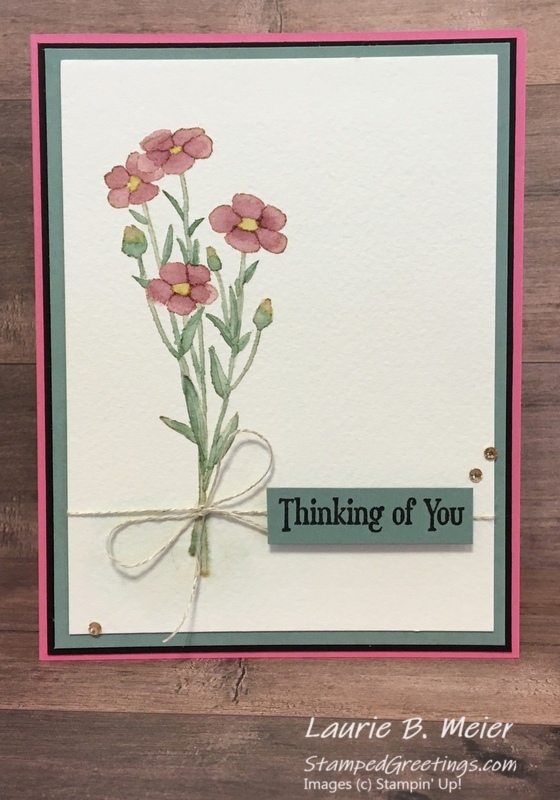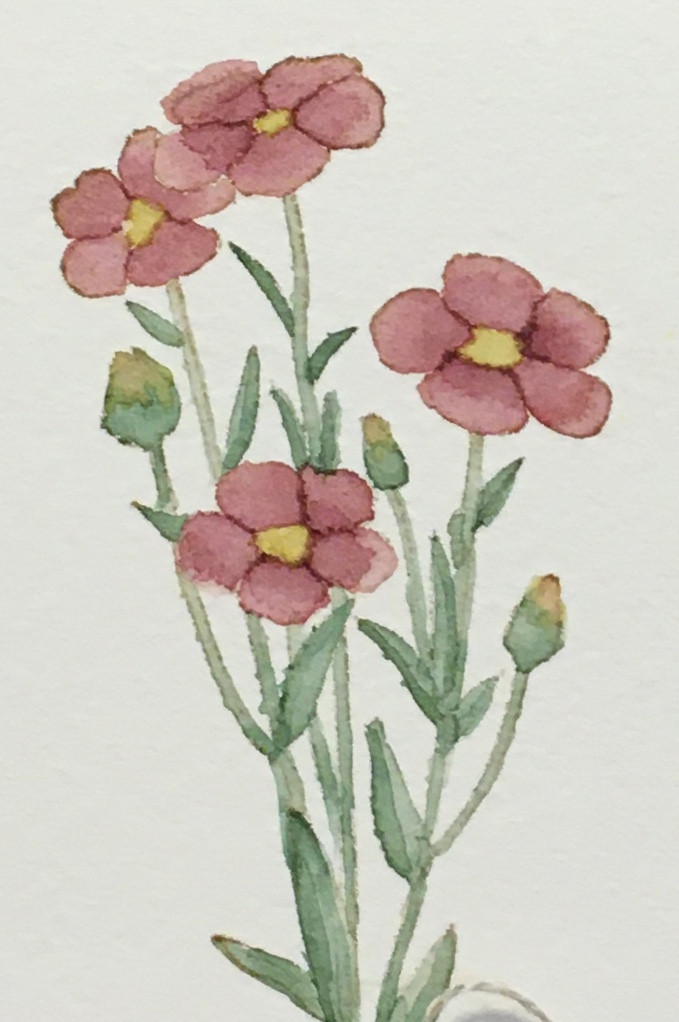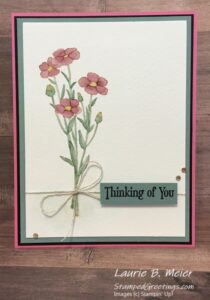Welcome to the July NC Demos Blog Hop! Our projects for this month are all FAUX-tastic! How fun is that!?!? There are so many faux techniques that are used in stamping. You’re definitely going to see a great variety in this month’s hop.
I hope you just came over from Jo Anne’s post. Wasn’t her project amazing (as always)? Thank you so much for stopping by to see my FAUX-tastic project.
Until I created the card below, I never tried faux watercoloring (also called no-line watercoloring). The technique seemed pretty intimidating to me. But, thanks to Tracie’s theme for this month, I decided to take the plunge. Below is the result of my first attempt at faux watercoloring.
It’s definitely not a Monet painting! But, it was a lot of fun to make and I will be trying more stamped images to make faux watercolor cards.
Here are the basic steps that I used to create the card:
- Start with a piece of Watercolor Paper cut to 3 3/4″ x 5″.
- Stamp the flower image from the gorgeous Quiet Meadow stamp set onto the left side of the Watercolor Paper, as shown, using Crumb Cake ink. You don’t need a dark image of the flower. In fact, you may want to stamp off once before you stamp onto the Watercolor Paper. The key is to be able to see the outline of the image that you’re going to watercolor.
- Grab your Water Painters and an acrylic block. I like the size E or F acrylic block for this technique. The acrylic block is going to be your palette!
- Pick some of your favorite colors that you want to use to watercolor. You can use Stampin’ Write Markers or Classic Stampin’ Pads. It doesn’t matter which. If you’re using markers, scribble one color onto your acrylic block. If you’re using ink pads, add some ink directly onto your acrylic block. You don’t need to take up much room for any one color. You will actually add several colors to the acrylic block as you watercolor your image.
- Fun tip – Don’t worry about the ink drying on your acrylic block. You will be able to regenerate the ink by touching your wet Water Painter to the ink. In fact, you could come back the following day to finish your project!
- I used Old Olive, Garden Green, Melon Mambo, and Crushed Curry inks to watercolor the image.
- Fill the Water Painter (I like to use the smallest one) by unscrewing the barrel and adding water. Squeeze the barrel a little until the brush is wet. It should not be dripping with water, just wet. And, dip the brush into the color on your acrylic block.
- Add the color to the stamped image. For example, you might start by adding color to the petals in the flowers.
- Important tip – I added color to every other petal as I watercolored, and let the colored petal dry. Why? Well, if you add color to two petals that touch each other before one of the petals is dry, the color will bleed from one petal to another. When you watercolor, you create pools of water that contain color. Until an individual pool is dry, if you add more ink to the pool, the ink will spread throughout the pool. Allow the “every other petal” to dry before you go back and color the petals that are next to them. Then, you’ll have no issues! Consider this technique of “every other” for leaves, stems, and other parts of the design. If you’re impatient in allowing the areas to dry naturally (doesn’t take long at all – just test if the area is dry by touching your paper with your finger), you can always force the drying process with your heat gun.
- When you’re done with one color, simply take off the color from your Water Painter by scribbling the brush on a scrap piece of paper or paper towel. Then, start with another color.
- The original stamped image (in my case the Quiet Meadow flower that was stamped in Crumb Cake) disappears as the watercoloring is done. That means that the “lines” of the original stamped image are lost in the process.
- Another tip that I will give you is to allow yourself some grace when you first try the faux watercoloring technique. You will find the amount of ink and water that works well for you. Wine and jazz music also helped me as I watercolored 🙂
I wanted to challenge myself in another way when I made this card. The “clean and simple” style of card making can be tricky since many of us tend to be uncomfortable with a lot of blank space on a card. Well, I can say that is true for me. But, I wanted to keep this design truly “clean and simple”.
The finishing touches for the focal point include the pretty “Thinking of You” sentiment from the Quiet Meadow stamp set which was stamped in Memento Black Ink onto Lost Lagoon cardstock. I simply used my snips to cut out the sentiment into a rectangle shape.
A bit of Linen Thread is wrapped around the bottom of the focal point piece, and a bow is tied at the bottom of the flower stems. The sentiment is added with dimensionals.
To put the card together, I decided to have layers of color cardstock added around the focal point to give a nice border to the design. Those color cardstock layers include Lost Lagoon (cut to 4″ x 5 1/4″) and Basic Black (cut to 4 1/8″ x 5 3/8″). The card base is Melon Mambo cardstock cut to 5 1/2″ x 8 1/2″, scored at 4 1/4″ on the 8 1/2″ side.
The final touch is a little bling. A few Neutral Adhesive-Backed Sequins did the trick!
I hope you give the faux watercoloring technique a try, if you haven’t already. If you have done the faux watercoloring and have some tips to pass along, I would love to hear them!
Now, be sure to hop on over to Kelly’s post. I know she has a fabulous FAUX-tastic project to share. And, be sure to check out the list below of the blog hoppers for this month. You definitely want to see everyone’s projects.
The main products that I used to create my FAUX-tastic watercolored card are shown below. Simply click on any picture to go to my online store and add the product to your stash!
Inky hugs,
Laurie
July 2023 Blog Hoppers –
Tina Lesson
Jo Anne Hewins
Laurie Meier <— YOU ARE HERE
Kelly Taranto
Tracie Evans Langley
Main Products Used in My FAUX-tastic Project –
|
|
|
|
|
|
|
|
|
|
||
|
|
||
|
|
|
|
|
|






















